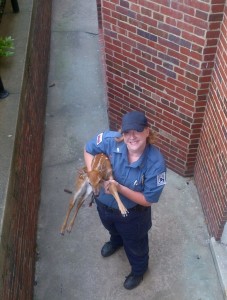
On a typical day at City Wildlife, depending on the season and the weather, we take in anywhere from zero to fifteen or more animals. About half of them are brought in by concerned citizens. The other half are brought in by one of the District’s Animal Care and Control Officers (ACOs). On any given day, ACOs respond to multiple calls which can range from runaway dogs and lost cats to injured and orphaned wildlife. Like City Wildlife, the number and types of calls vary with the seasons. In the winter, DC Animal Care and Control may receive one wildlife call per month. In the summer, the number could be closer to two hundred calls per month.

Most calls–like a raccoon stuck in an overturned trash can, an opossum marooned in someone’s shed, or an orphaned squirrel found on the sidewalk–can be resolved quickly. Others, like caring for an injured deer, may require the time and coordination of several officers.
With any wildlife call, the primary goal is to resolve the situation in a way that best protects everyone involved and results in a positive outcome for the animal. Ideally, “less is more”, but minimal interference is not always possible. Sometimes intervention is necessary.
When we get a call, the first thing we assess is whether the animal is truly in need of human intervention. We can often resolve a situation over the phone. If an intervention is required, we try to determine the fastest and best way for the animal to get to us. We always ask people to bring the animal to us if they can, and if it is safe to do so. If not, DC Animal Care and Control will pick up the animal as soon as an officer becomes available, and transport it to us. The unsung heroes of animal care, ACOs care deeply about the animals they work with and try their best to resolve any situation in the most humane way possible.
A good rule of thumb when trying to determine what to do when you find an animal is to first answer these three questions:
- Is it an adult or baby animal?
- Is the animal injured?
- Is the animal in imminent danger?
In general, if you can approach an adult wild animal and it does not run or fly away, it probably needs help. Healthy baby animals, on the other hand, are often best left alone to be cared for by their parents. We are always happy to provide over the phone assistance and prefer to do so by phone rather than e-mail for animal emergencies. You can reach us at (202) 882-1000 from 9 am – 5 pm daily, or call DC Animal Care and Control at (202) 576-6664.
To learn more about what to do if you find an injured animal, click here.


Hello I am so glad I found your webpage, I really found you by error, while I was searching onn Digg for
something else, Regardless I am here now and would just like to say
kudos for a fantastic post and a all round exciting blog (I also love the theme/design), I don’t have time
too read through it all at tthe minute but I have saved it and also included
your RSS feeds, sso when I havbe tiume I will be back to
rea a lot more, Please do keep up the fantastic jo.
Thanks Micah!